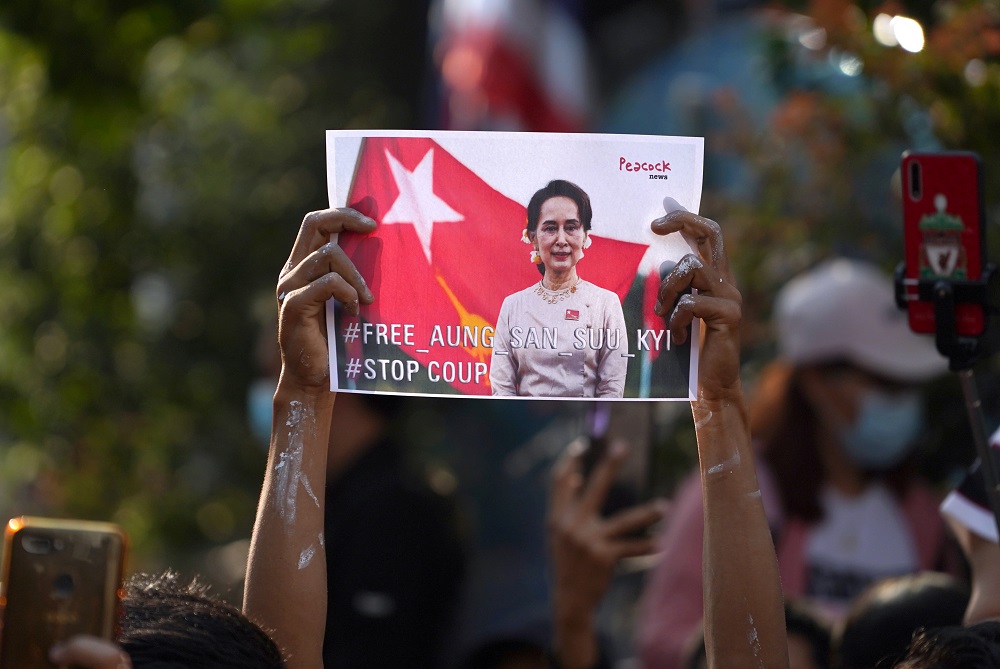NEW YORK, Feb 4 ― The United Nations said it would mobilise international pressure to ensure the failure of Monday's military coup in Myanmar, as Myanmar police filed charges against ousted leader Aung San Suu Kyi for illegally importing communications equipment.
Nobel Peace laureate Suu Kyi was detained on Monday, along with other civilian politicians. She is being held under house arrest in the capital, Naypyidaw, according to an official from her party.
A police request to a court detailing the accusations against Suu Kyi, 75, said six walkie-talkie radios had been found in a search of her home in Naypyidaw. The radios were imported illegally and used without permission, it said.
The document reviewed on Wednesday requested Suu Kyi's detention “in order to question witnesses, request evidence and seek legal counsel after questioning the defendant”.
A separate document showed police filed charges against ousted President Win Myint for violating protocols to stop the spread of the coronavirus during campaigning for an election last November.
Suu Kyi's National League for Democracy (NLD) won that election in a landslide but the military, headed by Army chief General Min Aung Hlaing, claimed the vote was marred by fraud and justified its seizure of power on those grounds. The electoral commission had said the vote was fair.
The takeover has cut short Myanmar's long transition to democracy and drawn strong condemnation from Western countries, the G7, and the United Nations.
“We will do everything we can to mobilize all the key actors and international community to put enough pressure on Myanmar to make sure that this coup fails,” United Nations Secretary-General Antonio Guterres said during an interview broadcast by The Washington Post yesterday.
“It is absolutely unacceptable after elections ― elections that I believe took place normally ― and after a large period of transition.”
Addressing the coup in Myanmar was a priority for the United States and Washington was reviewing possible sanctions in response, the White House said yesterday.
The chair of the Asean (Association of Southeast Asian Nations) Parliamentarians for Human Rights, Charles Santiago, said the new charges were ludicrous.
“This is an absurd move by the junta to try to legitimize their illegal power grab,” he said in a statement.
Reuters was not immediately able to reach the police, the government or the court for comment.
Suu Kyi spent about 15 years under house arrest between 1989 and 2010 as she led the country's democracy movement, and she remains hugely popular at home despite damage to her international reputation over the plight of Muslim Rohingya refugees.
The military had ruled Myanmar from 1962 until Suu Kyi's party came to power in 2015 under a constitution that guarantees the generals a major role in government.
The junta has declared a one-year state of emergency and has promised to hold fair elections, but has not said when.
Opposition emerges
Opposition to the junta has begun to emerge in Myanmar.
Staff at government hospitals across the country of 54 million people stopped work or wore red ribbons as part of a civil disobedience campaign.
The newly formed Myanmar Civil Disobedience Movement said doctors at 70 hospitals and medical departments in 30 towns had joined the protest. It accused the army of putting its interests above a coronavirus outbreak that has killed more than 3,100 people, one of the highest tolls in Southeast Asia.
“We really cannot accept this,” said 49-year-old Myo Myo Mon, who was among the doctors who stopped work to protest.
The 15-member UN Security Council is negotiating a possible statement in response to the junta's actions. The initial draft put forward by Myanmar's former colonial power Britain condemned the coup, and called for the military to respect the rule of law and human rights and immediately release those detained.
However, such statements have to be agreed by consensus and diplomats said the language would likely need to be softened to win the support of China and Russia, who have traditionally shielded Myanmar in the Security Council.
On Tuesday, the UN special envoy for Myanmar, Christine Schraner Burgener, urged the Security Council to “collectively send a clear signal in support of democracy in Myanmar.”
But a diplomat with China's UN mission said any action should avoid escalating tension or complicating the situation.
China has not specifically condemned the coup in its neighbour but the foreign ministry rejected the suggestion that it supported or gave tacit consent to it.
“We wish that all sides in Myanmar can appropriately resolve their differences and uphold political and social stability,” foreign ministry spokesman Wang Wenbin told a briefing. ― Reuters






















